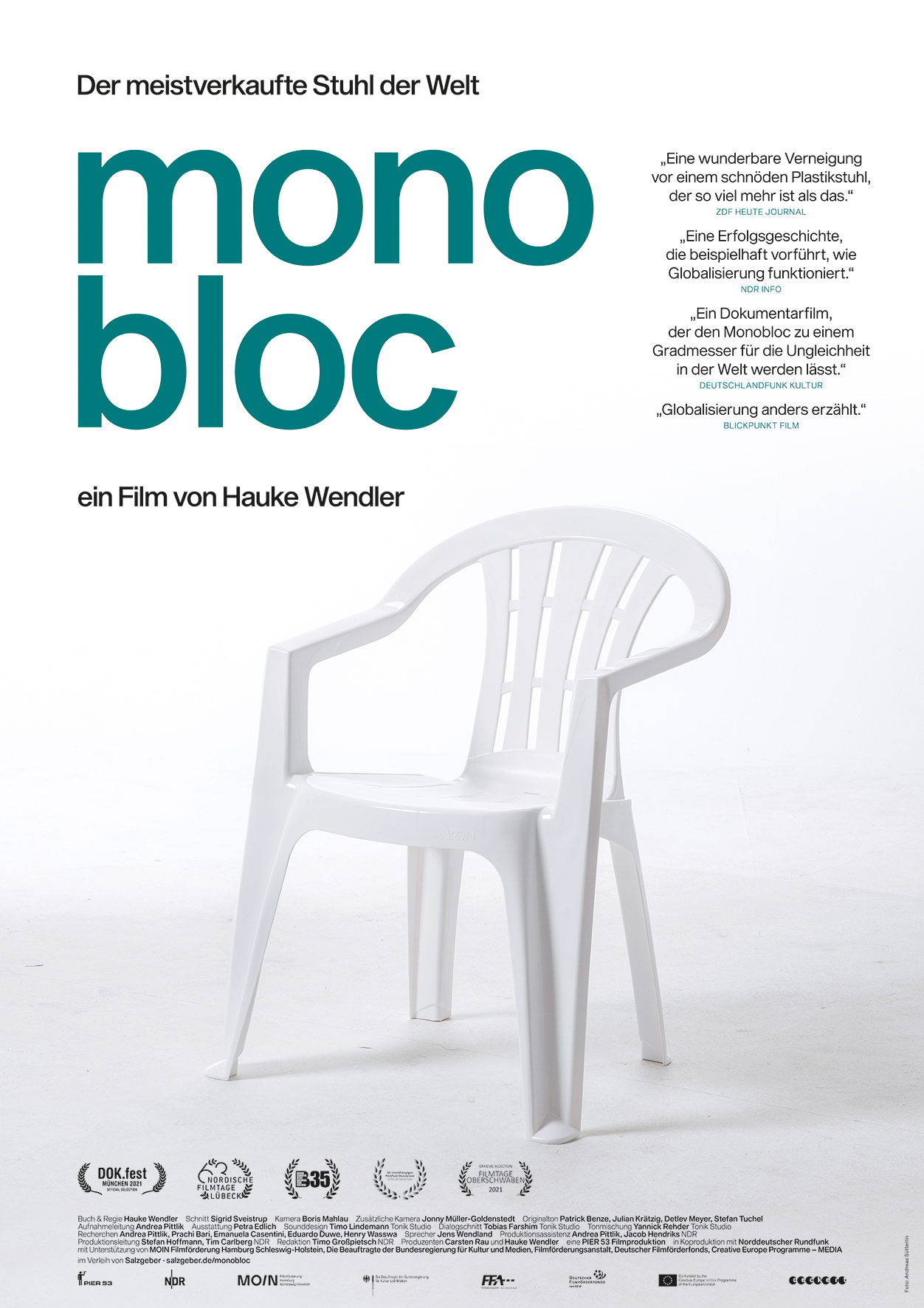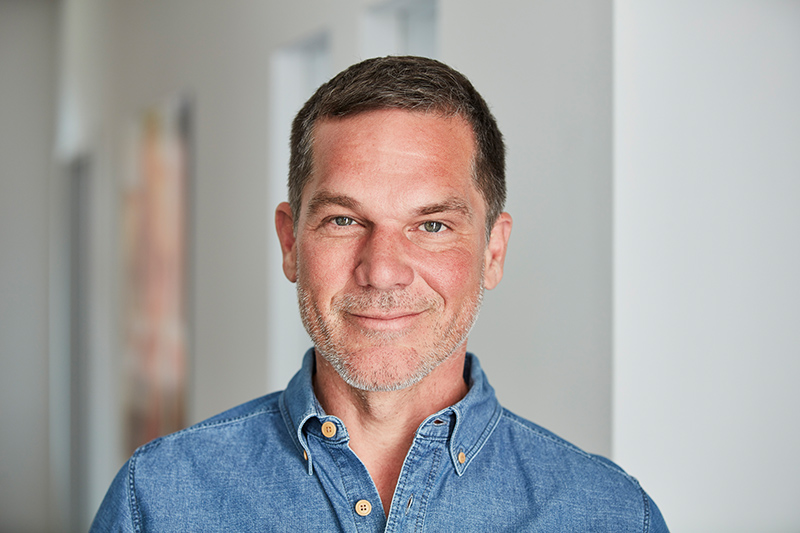MONOBLOC
(90 min., Germany 2021)
(90 min., Germany 2021)
(90 min., Germany 2021)
The monobloc is the best-selling piece of furniture of all time. Estimates claim there are a billion of these cheap, often white plastic chairs in use – all over the world, in every country and every corner. How could it have come to this?
The feature-length documentary MONOBLOC tells the story of how this unassuming chair ridiculed by many conquered the world. How it destroys livelihoods and brings affluence. How it threatens our environment and ‘good taste’. Yet also about how the monobloc is indispensable for millions of people to whom a chair is a chair and nothing more.
Grimme Prize winner Hauke Wendler worked on this film for eight years. Together with his camera team he travelled across half the world, from an industrial park in Italy to Uganda, the USA and on to the megacities of India, all the way to a favela in Brazil.
At the end of this long journey the film breaks our ultracomplex consumer world down to the question of what it truly takes in the life of a human being to be happy. MONOBLOC is a tale that an object tells with a critical eye toward globalization, a story that spans functionality and beauty, capitalism and sharing, consumption and recycling.
Director: Hauke Wendler
Director of Photography: Boris Mahlau
Film Editor: Sigrid Sveistrup
Music: Taco van Hettinga
Sound Mixing: Yannick Rehder
Commissioning Editor: Timo Großpietsch (NDR)
Production: PIER 53 Filmproduktion
Film distributor: Edition Salzgeber
World sales: Deckert Distribution

Dok.fest Munich, Germany
European Film Festival Palić, Serbia
Luxembourg City Film Festival
Copenhagen Architecture Film Festival
Architecture Bologna
Cinema Jove – Valencia Int. Film Festival, Spain
International Architecture Film Festival Barcelona, Spain
Lodz Design Festival, Poland
Milano Design Film Festival, Italy
Braunschweig International Film Festival, Germany
FilmFest Osnabrück, Germany
Kasseler Dokfest, Germany
Filmtage Oberschwaben, Germany
Nordische Filmtage, Lübeck, Germany
Stranger than Fiction, Germany

“Brilliant idea of Hauke Wendler’s to retrace the success story of this chair. Because it showcases in such an exemplary fashion how globalization functions.”
(Walli Müller, NDR Info, radio broadcast)
“The documentary tells not only a tale of design history, at the same time it’s an exercise in aesthetic humility because it casts light on the monobloc’s role in the not so affluent world, too.”
(Kathleen Hildebrand, Süddeutsche Zeitung)
“Wendler’s film was shot before the pandemic. In other words, it has nothing at all to do with the coronavirus, yet – just like FFP2 masks – it stands for the ONE world we all live in.”
(Wulf Schmiese, senior editor, Heute Journal, ZDF network)
“A documentary film that not only relates the story of this furniture but simultaneously allows the monobloc to become a yardstick for inequality in the world.”
(Gesa Ufer, Deutschlandfunk Kultur)
“The film team travels across five continents and visualises so pointedly how truly globally this chair links people. This film is a wonderful bow to a disdainfully modest chair that’s so much more than that.”
(Barbara Lueg, Heute Journal, ZDF network)
“The film MONOBLOC by Hauke Wendler is a very special portrait. A story about globalization at its finest.”
(Daniel Sponsel, director of DOK.fest München)
“To make a full-length documentary film about a plastic chair – the notion was so absurd it was clear from the get-go: ‘I have to see it!’”
(Mo, Tele-Stammtisch, film podcast)
“Globalization told differently for a change.”
(Blickpunkt:Film)
“An astute film about the highs and lows of a mass-produced article.”
(Antje Harries, kinokino, Bayerischer Rundfunk network)
“Hauke Wendler has found a fabulous topic and knows how to stage it in an appropriately intricate way.”
(Kay Hoffmann, Haus des Dokumentarfilms)
“The longer the film goes on, the clearer it becomes how our value judgments are based on a pampered, arrogant view of the world. A very savvy film.”
(Daniela Kloock, art-in-berlin)
“This chair holds lots of surprises in store.
Worth seeing: 5 out of 5 stars.”
(Hans-Albrecht Lusznat, Film-TV-Video.de)

How does one come up with the idea to make a film about a plastic chair?
Hauke Wendler: I saw a photo in the newspaper back in 2013: Dozens of plastic chairs were lined up in a desert before a setting sun. I thought to myself, what a fabulous photo and what an incredible conglomeration of plastic junk. That was when my fellow filmmaker and I decided to make this film.
8 years from the initial idea to completion – that’s quite a long time.
Hauke Wendler: No doubt about it. But when you run a production company you have to orient yourself in line with current developments. Starting in 2013 we made 3 feature-length films on the subjects of fleeing and migration. Because that’s one of our thematic emphases and all of a sudden the room was there to produce those films. They were projects that meant a lot to us, too, so MONOBLOC simply had to wait. And I’m all the happier that we were able to finish shooting before the coronavirus took hold. Otherwise it would’ve gotten tight.
When you work so long on a film project, is there also a point where you say that’s it, I’ve had enough?
Hauke Wendler: The thought crosses your mind every now and then. But as a filmmaker, and even more so as producer, I’d say that’s no option. With MONOBLOC, the film’s major strength was simultaneously its weak point, too. A so-called “property” like this falls through the grid, the usual range of subjects that TV networks in Germany support. And then it gets really hard to finance that kind of project. In between it felt like we were selling broken-down used cars.
Among other locations you filmed in Uganda, India and Brazil. You really got around with this film, didn’t you?
Hauke Wendler: That’s the truth. The film led us halfway around the world, although I’d tend more to say: it drove us. On the one hand it was thrilling. On the other, I can clearly recall that at some point my 12-year-old son stood in front of me and said: Haven’t you had enough of that plastic chair yet? Which makes me even happier that the film is finished now and turned out the way we had hoped it would. I’d say that’s the actual challenge when you’re making documentary films.
How has your view of the chair changed over the years?
Hauke Wendler: At the beginning the monobloc was a kind of ludicrous object for me as well: no ambition whatsoever, not particularly pretty, and ecologically questionable. Over the years and the many encounters with people who at times tell very moving stories in the film, completely different issues arose in my mind, including thoughts about our world and the world order on the whole. That was the real surprise from this production: The farther we moved away from home, the more I learned about our lives in Germany and the privileges here.
Now the world has been struggling with the coronavirus for quite a while. Is this the right point in time for a film about a plastic chair?
Hauke Wendler: If you could take the billions that are invested in films each year to rid the world of hunger and misery, then I’d sign on right away. But that’s just not the way things run. I think it’s that much more important that films, books, pictures or music are there to mirror our everyday lives in them, and also in comparison to the rest of the world. During the crisis this has become quite clear once again, and MONOBLOC is coming at just the right time.
What do you mean by that?
Hauke Wendler: During the coronavirus crisis I realized again just how much we in the Western world constantly revolve around ourselves and our anxieties. Our film MONOBLOC sets a counterpoint to this by saying in an entertaining but equally moving way: Look, that’s the world out there, and its mindset is different from the way you think. Completely different.
PIER 53 Filmproduktion
in co-production with
Norddeutscher Rundfunk
funded by
Film Fund Hamburg Schleswig-Holstein
The Federal Government Commissioner for Culture & the Media
German Federal Film Board
German Federal Film Fund
Creative Europe Programme – MEDIA
A film by
Hauke Wendler
Film Editor
Sigrid Sveistrup
Director of Photography
Boris Mahlau
Music Composer
Taco van Hettinga
Additional Camera
Jonny Müller-Goldenstedt
Sound
Patrick Benze
Julian Krätzig
Detlev Meyer
Stefan Tuchel
Aerial Photography
Patrick Benze
Thulunga Basumatary
Julian Krätzig
Boris Mahlau
Oliver Richardt
Dolly Grip
Carsten Scharrmann
Anne Beyer
Special Effects
Gerald Gustav
Stills Photography
Jonny Müller-Goldenstedt
Marco Grundt
Line Producer
Andrea Pittlik
Runner
Marga Glanz
Sven Hoferichter
Production Design
Petra Edlich
Set Design
Christoph Breitmar
Ralf Austel
Research
Andrea Pittlik
Prachi Bari
Emanuela Casentini
Eduardo Duwe
Henry Wasswa
Location Scouts
Prachi Bari
Eduardo Duwe
Petra Edlich
Oliver Richardt
Henry Wasswa
Drivers
Ronélio Moreira Bulcão
Bagga Singh
Saul Zaake
Transcription
Anne Schmalfeldt
Paula Neunzig
Translation
Samuel Bawala
Emanuela Casentini
Maria Cecília Lima de Araujo
Neeru Franck
Leigh Hoch
Travel Agency
Monika Wever, Fairlines
Equipment Rental
Detlef Lutz, MBF
Matthias Stiehler, Cine-Mobil
Assistant Film Editor
Lukas Hinsch
Graphic Design
Katja Reise
Nina Höffken
Title Design
Georg Krefeld
Jens Reitmeyer
Musicians
Taco van Hettinga (Keyboard, Piano, Saxophone, Bass)
Deniz Erarslan (Guitar)
Samuel Wootton (Percussions)
Music Mixing
Daniel Bongard
Taco van Hettinga
Narrator
Jens Wendland
Sound Design
Timo Lindemann, Tonik Studio
Dialogue Editing
Tobias Farshim, Tonik Studio
Sound Mixing
Yannick Rehder, Tonik Studio
Image Editing
Oliver Stammel
DCP Mastering
Martin Heckmann, Kinopost
Photo Archives
Alamy
Picture Alliance
Reuters
Free Wheelchair Mission
Jürgen Lindemann
Jens Thiel, Monobloc Archiv
Additional Video Footage
Jens Thiel, Visit at Henry Massonnet’s, 2005
Production Assistants
Andrea Pittlik
Jacob Hendriks, NDR
Production Management
Stefan Hoffmann
Tim Carlberg, NDR
Commissioning Editor
Timo Großpietsch, NDR
Executive Producers
Carsten Rau und Hauke Wendler
Film distributor
Edition Salzgeber
World sales
Deckert Distribution

